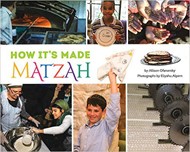Young Jacques and his parents pass as Catholics in their French village during World War II in order to hide their identity as Jews. Despite the danger, father and son join a group of men on a nearby mountaintop to hold a Seder for Passover. The table is nearly bare and the atmosphere is anything but joyful, but the men find solace in the observance.
Like The Cats in Krasinski Square by Karen Hesse (Scholastic, 2003), this is a Holocaust era slice of life, a story of resistance and ultimately of hope. However, it shares with Cats the requirement that the reader come to the book already understanding the historical context. An endnote gives a very broad overview, but it is not sufficient for readers wholly unfamiliar with the Holocaust. In addition, this book requires readers to be familiar with Passover observance so that they will see the difference between this secret Seder and a normal Seder. McCully’s paintings are beautiful and the faces are expressive. The dark quality of the paintings befits the mood of the story. However, the illustrations are somewhat static, as so many of them depict the same group of men huddling around a bare table. While the story is well-written and well-illustrated, its use may be limited. It is not a Passover story and it is not a general Holocaust story. It is a very specific story of Jewish resistance. It would work well to flesh out a lesson on the topic of resistance or of Jews in hiding during the war, although its picture book format may reduce its appeal to those readers old enough to appreciate the subject matter. For ages 9 – 14.





